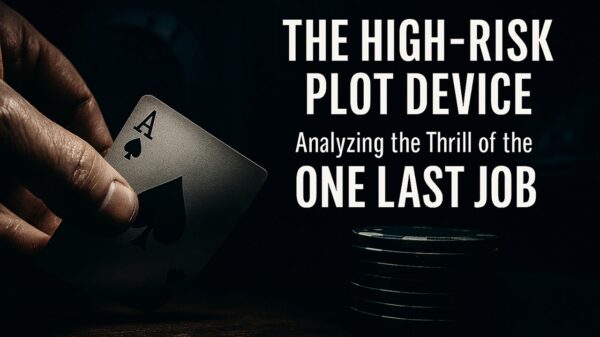
Every great crime thriller or sci-fi epic understands the narrative power of the high-stakes risk. We analyze the common “one last job” trope to understand why placing a high-risk bet functions as the ultimate emotional shortcut in storytelling, mirroring the appeal of modern online casino engagement.
In television and film, every story needs a catalyst, a moment that changes the character’s status quo irrevocably. Often, this moment is found at the intersection of desperation and opportunity: the high-stakes gamble. Think of the climax of Ocean’s 11, the escalating wagers in The Queen’s Gambit or any character in Breaking Bad forced to commit to an unthinkable risk. These moments aren’t just filler. Not at all. They are the compressed plot devices that instantly communicate a character’s needs, their morality and the irreversible weight of the consequences.
The trope of the “one last job” is particularly potent. It hinges entirely on the promise of escaping a dull, predictable life through a single, improbable act of bravery or genius. It sets up an elegant narrative tension: high potential reward offset by near-certain, disastrous consequence. The viewer’s engagement becomes less about how the heist is pulled off and more about the simple, exhilarating risk/reward calculation. This same psychological tension is exactly what drives the appeal of engaging with a high-quality online casino environment. It allows a user to step into that fictional mindset of the “high risk, high reward” player, testing the limits of fortune and strategy from the comfort of their home.
The Mathematics of Cinematic Tension
A showrunner or screenwriter is essentially a risk manager, carefully controlling the audience’s emotional exposure. To generate plot momentum, the payoff for the gamble must be enormous, but the probability of success must remain critically low.
When a character steps up to a casino table in a TV drama, the tension isn’t about the money itself; it’s about the uncertainty of the outcome relative to the known consequences if they fail. For instance:
- The Mark (Known Consequence): The character needs to win $50,000 to save their family business, a known, tangible consequence.
- The Bet (Uncertain Outcome): They bet their entire remaining stake on a single card draw. The outcome is binary: success or ruin.
This compression of fate into a few seconds of action is cinematic gold. For the viewer, it’s a vicarious thrill. For the user, the full spectrum of modern digital entertainment, offered by platforms like Goldenbet (https://goldenbetcasino.org/), provides this highly distilled emotional rush. Here, you can engage with dozens of different narrative structures, from the instant gratification of themed slots (the equivalent of a quick, dramatic jump scare) to the long-form strategic payoff of sports betting and live casino games. It allows users to participate in that familiar narrative tension without the dramatic, life-altering fallout seen on screen. It transforms the act into a contained, personal plot device.
The Mastermind’s Strategy: Beyond Blind Luck
While the narrative focuses on the risk, the best cinematic gamblers are always “strategic masterminds” so to speak, not just victims of blind luck. They do their homework, like researching the marks, studying the security systems and counting the cards. This underscores a vital parallel: the dedication to research and strategy in both fictional narratives and real-world involvement.
Any fan who has spent time analyzing the lore and backstory of a complicated show (say, tracking down the history of a House in Game of Thrones or the lineage of a Time Lord in Doctor Who) knows the satisfaction of gathering vital, often overlooked information. In the betting world, this corresponds to the methodical research into game mechanics, odds and platform reliability.
A sophisticated user doesn’t treat the process as random; they treat it as an extension of their own strategic capabilities, viewing the odds as a complex puzzle that, with enough analysis, might yield a favorable outcome. This mindset (the commitment to meticulous planning before executing the “job”) is what separates the protagonist from the easily fooled antagonist.
The Final Cut: Escaping the Predictable
At the end of the day, the power of the “one last job” plot device is its ability to break the character out of a boring, linear narrative. You know, the financial stasis, the dead-end job, the predictable plot.
Modern online casinos offer a similar psychological break. They provide highly refined interfaces and fast-paced engagement designed to give the user that instant hit or dose of excitement, allowing them to shift from the passive experience of watching a story unfold to the active experience of writing their own plot twist. It’s an exercise in agency and controlled risk. By focusing on the structural parallels between successful narrative tension and the engagement features of online platforms, we see that the appeal of the high-stakes gamble is not just about the money; it’s about the fundamental human desire for an unpredictable, exciting change in the storyline.
There is no escaping change. It is a fundamental principle of life. So, embrace it, like your favorite protagonist would.
